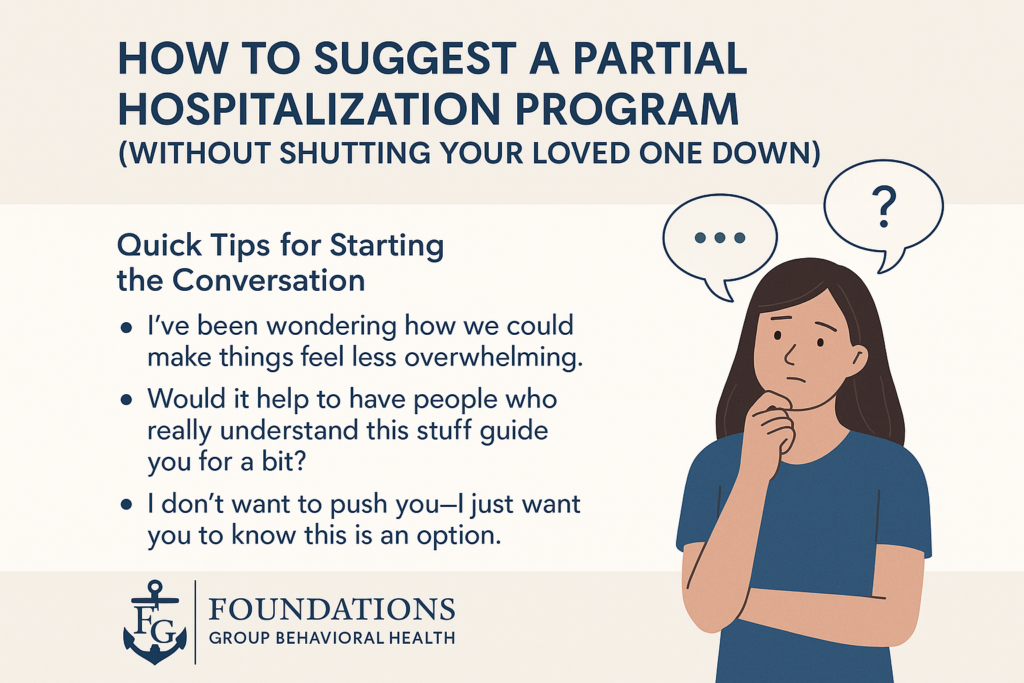When your young adult child is struggling—again—every conversation can feel like walking through a minefield. You know their patterns. You’ve seen the shutdown, the defensiveness, the disappearing act after one too many “helpful suggestions.” The fear of saying the wrong thing can be paralyzing. But you’re also terrified of what happens if you stay silent.
If you’ve been wondering how to gently suggest more structured help, like a Partial Hospitalization Program, without pushing them away, you’re not alone. Many parents feel caught between hope and heartbreak.
Here’s a way to approach this delicate conversation with love, respect, and strategy—so you can offer help without closing the door.
Why a Partial Hospitalization Program Can Be an Easier Yes
When young adults hear the word “treatment,” many instantly imagine the extreme: hospitalization, lockdown, no freedom. That mental image can trigger resistance before you’ve even finished your sentence.
But a Partial Hospitalization Program (PHP) is different—and it helps to frame it that way from the start. PHP offers intensive daytime care with the freedom to return home in the evening. It combines therapy, psychiatric care, and skill-building with the flexibility to stay connected to home life.
This can make PHP feel less like a punishment and more like a bridge—especially for those who’ve resisted the idea of inpatient care.
At Foundations Group Behavioral Health, PHP helps clients near Cape Cod, MA stabilize their mental health while maintaining a sense of personal freedom. It’s structured support, not confinement.
Step One: Acknowledge the Struggle Without Assigning Blame
You know your child is struggling. They know it, too—whether or not they admit it. Starting from a place of shared concern rather than judgment keeps the conversation open.
You could try:
“I’ve noticed things have been really hard lately. I’m worried about you, and I imagine you’ve been feeling that too.”
This approach makes it about your care, not their mistakes. You’re not accusing—you’re observing with love. That small shift can make a huge difference.
Step Two: Open the Door with Curiosity
Young adults tend to respond better to curiosity than directives. Instead of “You need to do this,” try opening up the conversation with gentle exploration.
“Have you ever wondered what it might be like to get support that isn’t full hospitalization?”
Or even:
“I came across something called a Partial Hospitalization Program—it’s care during the day but you come home in the evening. Have you heard of it?”
By introducing PHP as a possibility rather than a prescription, you help them feel involved in the decision—not forced into it.
Step Three: Frame Support as a Resource, Not a Fix
When people are hurting, feeling “broken” or like a “project” can quickly cause them to shut down. As a parent, you can shift the focus from “fixing” to “supporting.”
A helpful phrase could be:
“You’ve been trying so hard to get through this. I don’t think anyone should have to do it alone.”
Or:
“PHP isn’t about saying you’ve failed—it’s about having extra tools and support to make life feel manageable again.”
At its core, this reminds your child they are worthy of help—not because they’ve failed, but because they’re human.
Step Four: Stay Calm When You Hit Resistance
Expect pushback. It’s normal. Even gentle suggestions can stir up defensiveness, especially when someone is hurting. If your child says, “I don’t need that” or “That’s not for me,” avoid escalating.
A good response might be:
“I understand—it’s a lot to think about. I’m not saying it’s the only option, but I want you to have every choice in front of you.”
This plants a seed rather than building a wall. Sometimes, the initial rejection fades after the pressure of the moment passes.

Step Five: Let the Conversation Breathe
After you’ve introduced the idea, it’s okay to step back. You don’t need to get a “yes” right away. For many families, the first conversation is just that—an opening.
You might say:
“You don’t have to decide anything today. If you ever want to talk more about it or check out a program together, I’m here.”
This approach respects their autonomy while reinforcing your availability. Sometimes the most powerful thing you can do is offer help, then give them space to accept it.
Partial Hospitalization Program near Cape Cod, MA: What to Expect
At Foundations Group Behavioral Health, the Partial Hospitalization Program includes:
- Daytime therapeutic groups and individual counseling
- Psychiatric care with medication management
- Skills training to manage anxiety, depression, or other mental health struggles
- Evenings at home for continued connection and personal comfort
- A supportive, stigma-free environment designed for young adults
Families in Upper Arlington, OH trust PHP because it bridges the gap between too-little outpatient care and too-much inpatient hospitalization. It’s structured, but not overwhelming. Intensive, but not isolating.
Quick Tips for Starting the Conversation
📝 Conversation Starters That Build Bridges:
- “I’ve been wondering how we could make things feel less overwhelming.”
- “Would it help to have people who really understand this stuff guide you for a bit?”
- “I don’t want to push you—I just want you to know this is an option.”
Frequently Asked Questions About Partial Hospitalization Programs
What is a Partial Hospitalization Program?
A Partial Hospitalization Program (PHP) is a short-term, structured mental health treatment program where clients attend therapy and counseling during the day and return home at night. It’s designed for people who need more support than weekly therapy offers, but don’t require 24/7 residential care.
How long does a PHP last?
Most programs, including the one at Foundations Group Behavioral Health, last anywhere from 2 to 6 weeks, depending on individual needs and progress. Treatment is typically five days a week, offering consistent support without long-term disruption to life at home.
Will my child be “locked in” during PHP?
No. PHP is voluntary, flexible, and focuses on respect and collaboration. Participants can return home each evening and retain a sense of independence, which often leads to better engagement in therapy.
Is PHP only for people in crisis?
Not at all. PHP is often used as a preventive measure—to provide help before things reach a crisis point. It’s also helpful for people transitioning from a higher level of care, or who find outpatient therapy alone isn’t enough.
How do I bring up PHP without causing a fight?
Focus on curiosity, shared concern, and care. Use gentle language, respect their autonomy, and avoid ultimatums. Phrases like, “Would you be open to learning more about this together?” can lower defensiveness and encourage conversation.
Your Love Is Showing When You Offer Help
Suggesting help isn’t a betrayal of their independence—it’s an act of love. And offering an option like PHP shows you’re thinking about their well-being in a way that respects their freedom. You’re not giving up on them. You’re offering a lifeline that still lets them breathe.
📞 Ready to explore options together?
Call 888-685-9730 or visit to learn more about our Partial Hospitalization Program services in Massachusetts. Compassionate, flexible care is waiting.








